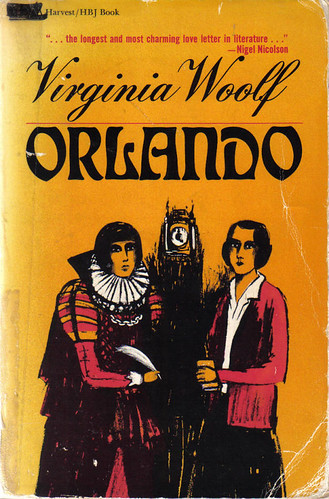 I think this is the fourth time I've read Orlando by Virginia Woolf (1928). I love Virginia Woolf and I really love this book. This time around I read it for the illustrious Smarter Than You Bookclub, at my own suggestion. I hope the other ladies like it too, but after this most recent read, I don't see how you couldn't just fall completely in love with this smart, funny, exciting and rewarding book.
I think this is the fourth time I've read Orlando by Virginia Woolf (1928). I love Virginia Woolf and I really love this book. This time around I read it for the illustrious Smarter Than You Bookclub, at my own suggestion. I hope the other ladies like it too, but after this most recent read, I don't see how you couldn't just fall completely in love with this smart, funny, exciting and rewarding book.Orlando starts his life out in the age of Queen Elizabeth as the son of a wealthy family who lives in a large estate in the English countryside. He grows up, falls in and out of love with society, falls in and out of (but mostly in) love with poetry, never loses faith in nature, and eventually (when he is thirty) takes an ambassadorship to Turkey to escape the attentions of a woman. And while he is there a very strange thing happens: he falls asleep, sleeps for a long time (during which there is a violent revolution all around him) and when he wakes up, he is a woman. No one is too surprised about this, least of all Orlando. She continues to do much the same things she did before, although some things are changed -- and Woolf delights in exploring why some things should be different as a woman than as a man. Luckily there is plenty of time for that since the book ends in 1928 and Orlando is only 36, even though she has been alive for 400 years. As Woolf writes:
And indeed, it cannot be denied that the most successful practitioners of the art of life, often unknown people by the way, somehow contrive to synchronize the sixty or seventy different times which beat simultaneously in every normal human system so that when eleven strikes, all the rest chime inn unison, and the present is neither a violent disruption nor completely forgotten in the past.
Orlando is not one of these people. In fact, her body and mind are so filled with times and personalities that it allows her to change gender and live for 400 years.
Woolf wrote Orlando while at the country estate of her beloved friend Vita Sackville-West. Woolf and Sackville-West were fascinated with each other and probably did have a few physical romantic encounters, although the overall evidence points to a more mental affair than a physical one. Vita Sackville-West's son, Nigel Nicolson calls Orlando "the longest and most charming love letter in literature," and it really is. Orlando is written as a biography (it even has an index!), and the pictures of Orlando as a woman are all actually pictures of Vita, Orlando's country estate is Vita's home, and many of the events and personalities of Orlando are based on Vita herself.
Nicolson wrote a really fascinating book about his mother, his father, and their devoted and unique marriage called Portrait of a Marriage (1973). If any of you bookclubbers are intrigued and want to borrow it, let me know -- it is a nicely structured balance between extracts from Vita's diary recounting her early life and her tumultuous affair with a woman and context, other sources, and history provided by Nicolson. There is also a bunch of Virginia Woolf stuff in there and the reaction of the Sackville family to the publication of the book.
And now three reasons why I also think Orlando is hilarious:
1. The Arch-duchess Harriet Griselda of Finster-Aahorn and Scandop-Boom in the Roumanian territory who pesters Orlando when she is a man, then pesters Orlando when she is a woman (as the Arch-duchess is really an Arch-Duke in disguise) and is only temporarily put off when Orlando cheats at Fly Loo and puts a frog down his shirt. [I just did a Google search for Fly Loo, which I thought Woolf had made up, but the game is perfectly described in this 1883 article in the New York Times. Who knew? (The Fly Loo bit is towards the top of the second column, but the whole thing is really worth reading. And like much journalism from the late 1800s, it is hard to tell if it is fact or fiction. Probably a bit of both. Thank you NYT for opening up your content!)]
2. Marmaduke Bonthrop Shelmerdine (who marries Orlando, but spends most of his time sailing dangerous waters)
3. Rattigan Glumphoboo (shorthand to describe "a very complicated spiritual state -- which if the reader puts all his intelligence at our service he may discover for himself.")
No comments:
Post a Comment